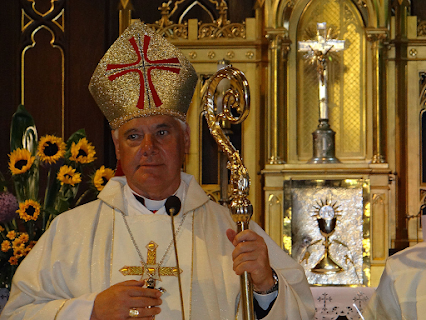Cardinal Müller sharply criticises Pope Francis in new book
After Archbishop Gänswein and Cardinals Pell and Zen, Cardinal Müller is now also speaking out publicly: in a new book he reports on his dismissal and how he explains it. He has quite a few criticisms of the Francis pontificate.
In a new book of interviews, Cardinal Gerhard Müller reports on how he experienced his surprising dismissal as Prefect of the Congregation for the Doctrine of the Faith. The book, entitled "In buona fede" ("In good faith"), will be officially published in Italian by the Solferino publishing house at the end of next week. In the first published excerpts of the conversation with Vatican journalist Franca Giansoldati, Müller is extremely critical of Pope Francis' conduct of office and complains about the Pontiff's arbitrary and centralistic decisions.
His dismissal as prefect at the end of June 2017 after five years at the head of the Congregation for the Doctrine of the Faith had hit him like a bolt from the blue. Just the day before, Pope Francis had publicly embraced him after the Mass for the Solemnity of Peter and Paul and assured him of his trust. At the audience the next day, he had wanted to discuss routine matters. Instead, he said, the Pope coolly dismissed him. "At the end of the brief conversation, he said tersely, 'You have fulfilled your mandate. I thank you for your work', without giving me a reason, and even afterwards he did not give me one," the cardinal reports. Müller claims to have learned that Francis had planned the dismissal long in advance and had called Müller's successor, the Spanish Jesuit Luis Ladaria, immediately after the audience.
Authoritarian and centralist tendencies
For Müller, this action by Francis is symptomatic of this pontificate. Other curial officials had also been dismissed surprisingly and without giving reasons at the Pope's behest. The Cardinal stressed, however, that he had always attached importance to remaining loyal to the papacy. He had also said this to representatives of the growing opposition to Francis within the Church. "The good of the Church, in my opinion, must always take precedence, it must remain an absolute principle. One must always strive to defend unity," Müller said. The cardinal does not know the reasons for his dismissal. But he suspects a dislike on Francis' part for his style, which the current Pope would have developed as a student in Germany: "I suspect that over time the Pope has cultivated a kind of distrust, a dislike for theologians, German academics." But he had always been concerned with fulfilling his task, he said. "The task of a prefect of the Congregation for the Doctrine of the Faith is to help the successor of Peter, to show him the way, to work together with him, keeping an eye on doctrine, even at the cost of raising questions in view of the danger of possible doctrinal errors in this or that document, in view of weak arguments that need to be strengthened and deepened," Müller said. But that does not mean being disloyal or hostile to the Pope. In general, Müller is in favour of cardinals expressing their opinions openly and critically.
The former prefect also takes offence at the Pope's perceived tendency, instead of focusing on decentralisation as announced, to also take small-scale decisions to himself. Using the example of the ban on priestly ordinations in the French diocese of Toulon, which was imposed last year, Müller explains that the Pope makes decisions that normally belong to the very own area of responsibility of diocesan bishops. The cardinal sees a close circle of confidants around Francis at work, who prepare decisions bypassing the structures intended for this purpose: "In the Vatican it seems that information circulates in parallel, on the one hand through the institutional channels, which unfortunately are consulted less and less by the pontiff, and on the other hand through the personal channels, which are even used for the appointment of bishops or cardinals."
Criticism of the handling of Cardinal Becciu
Müller clearly criticised the handling of Cardinal Angelo Becciu, who resigned from all offices and the prerogatives arising from the cardinalate in 2020 at the request of the Pope due to accusations of mismanagement. "You cannot punish someone without proving their guilt," Müller said. Becciu had been humiliated and punished in front of the whole world without having the possibility to defend himself, he said. His trial in the Vatican is still ongoing. Becciu has always maintained his innocence. Other topics Müller addresses in the book, according to the announcement, are the Vatican's foreign policy, especially with regard to China, the handling of abuse and moral-theological topics such as sexuality, anthropology and abortion, as well as assessments of the situation of the Church in Germany.
Since the death of Pope Benedict, conservative voices from the College of Bishops have been accumulating. The memoirs of Archbishop Georg Gänswein, in which he reports on his time with Benedict XVI from the first contacts in the Congregation for the Doctrine of the Faith, have already caused displeasure among cardinals and bishops and Pope Francis is also said to have disapproved of the publications, some of which were critical of him. An article by Cardinal George Pell, written shortly before his unexpected death at the beginning of the year, expressed massive reservations about the worldwide synodal process initiated by the Pope. This week, the Bishop Emeritus of Hong Kong, Cardinal Joseph Zen Ze-kiun, expressed similar sentiments in an interview.










.jpeg)

Comments